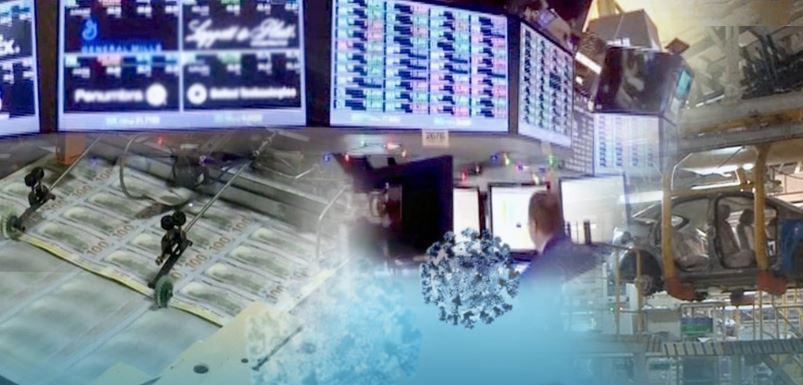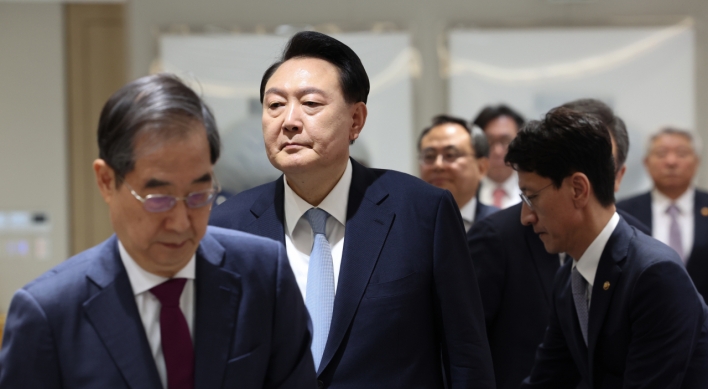Korean companies rev business engine amid ongoing coronavirus headwinds
Korean chipmakers in hot water as European and US firms opt for telecommuting
By Lim Jeong-yeoPublished : March 22, 2020 - 16:37

Even as foreign companies across the globe are increasingly suspending operations of production facilities and offices, South Korean firms are once again gearing up for full business operations.
Major Korean companies that had advised employees to work from home amid the spread of COVID-19 are now reopening offices as the situation in Europe and the US drastically worsens, hiking concerns of a global economic meltdown.
Despite reports of global facilities shutting down, and the commercial paper market essentially frozen, Korean conglomerates are implementing emergency business protocols.
Hyundai Motor and Kia Motors have halted operations at Alabama and Georgia plants in the US from Wednesday, while their Czech and Slovakian plants in Europe will close for two weeks starting Monday.
The automakers will resume normal operations Monday, halting their switch to telecommuting, which had been enforced from Feb. 27. Working hours will be flexible for staff to avoid contamination in public transport.
The automakers’ COVID-19 task force team had been focusing on securing stable parts supply from China, but they have expanded to the Americas and Europe as of late.
Korea’s biggest telecom service provider SK Telecom is also resuming workers’ commutes from Monday, with exceptions granted for pregnant employees.
While retightening the work structure, Korean companies are also running a check of their cashable assets. Concerns are building up centering on the slowing flow of commercial paper and the corporate bond market.
Commercial paper rates had recently marked an abrupt uptick, showing signs of a slowing credit market. The Financial Services Commission had convened a meeting with domestic brokerages to review the internal market situation.
Asset managers at conglomerates are reportedly seeking to prepare for the worst, tapping in to gauge the commercial paper issuing conditions amid market tensions.
The Korean government had on Thursday said that it is planning to form a stabilization fund for the bond market, which Minister of Economy and Finance Hong Nam-ki said will be in place until markets recover.
Among beneficiaries of the fund will be the aviation industry, which has arguably suffered the harshest economic blow from the pandemic. A group of airline firms have collectively requested the government stand surety for their corporate bonds.
Conglomerate leaders are encouraging their workers to stay focused.
Lee Jae-yong, vice chairman of Samsung Electronics, paid two visits to the operation front lines in the first two weeks of March. At the group’s affiliate Samsung Display in Asan, South Chungcheong Province, on Thursday, he said, “We must not halt even for a moment. We need to have the foresight to look ahead post-crisis,” as he oversaw the group’s quantum-dot display manufacturing line.
Lee had also visited Samsung Electronics’ Gumi plant in North Gyeongsang Province at the start of the month to oversee the smartphone production lines.
Samsung Electronics had never implemented group-wide telecommuting. Instead, it formed a COVID-19 task force whose responsibilities now not only cover ensuring worker safety, but also responding to needs at overseas plants.
Samsung Electronics’ main business engine, semiconductors are in a sticky situation as partners in Europe and the US endure difficulties with manufacturing in the fast-spreading COVID-19 crisis, and as the company’s home appliance plant in Slovakia will halt manufacturing for a week from Monday.
SK Holdings, the Korean conglomerate most actively enforcing a work-from-home culture, will bolster its emergency business mode. Chairman Chey Tae-won has reportedly called for an emergency gathering of subsidiary heads at the beginning of the week.
SK Innovation, a major SK subsidiary in charge of oil refining and electric vehicle battery production, is being lashed around by the plummeting global oil market and diminishing demand from global automakers.
The company had expanded telecommuting to the end of March, but key personnel are continuing to report to the office as per usual.
Semiconductor subsidiary SK hynix is not having its employees work from home due to characteristics of the semiconductor business which cannot be abruptly halted. The company is instead running a task force to respond to COVID-19 emergency situations.
The world’s three largest semiconductor parts suppliers -- the US’ Lamresearch and AMAT and the Netherland’s ASML -- have begun to advise workers to stay at home. The combined market share of their global semiconductor parts market amounts to 50 percent, meaning their slowing business would cause a chain reaction on Samsung Electronics and SK hynix, who both pool supplies from them.
Samsung Electronics and SK hynix are the world’s largest semiconductor firms, responsible for the majority of memory chips that go into smart devices around the globe.
The chipmakers still anticipate to see growing demand for DRAM, which facilitates non-face-to-face transactions more in demand due to COVID-19.
By Lim Jeong-yeo(kaylalim@heraldcorp.com)
Major Korean companies that had advised employees to work from home amid the spread of COVID-19 are now reopening offices as the situation in Europe and the US drastically worsens, hiking concerns of a global economic meltdown.
Despite reports of global facilities shutting down, and the commercial paper market essentially frozen, Korean conglomerates are implementing emergency business protocols.
Hyundai Motor and Kia Motors have halted operations at Alabama and Georgia plants in the US from Wednesday, while their Czech and Slovakian plants in Europe will close for two weeks starting Monday.
The automakers will resume normal operations Monday, halting their switch to telecommuting, which had been enforced from Feb. 27. Working hours will be flexible for staff to avoid contamination in public transport.
The automakers’ COVID-19 task force team had been focusing on securing stable parts supply from China, but they have expanded to the Americas and Europe as of late.
Korea’s biggest telecom service provider SK Telecom is also resuming workers’ commutes from Monday, with exceptions granted for pregnant employees.
While retightening the work structure, Korean companies are also running a check of their cashable assets. Concerns are building up centering on the slowing flow of commercial paper and the corporate bond market.
Commercial paper rates had recently marked an abrupt uptick, showing signs of a slowing credit market. The Financial Services Commission had convened a meeting with domestic brokerages to review the internal market situation.
Asset managers at conglomerates are reportedly seeking to prepare for the worst, tapping in to gauge the commercial paper issuing conditions amid market tensions.
The Korean government had on Thursday said that it is planning to form a stabilization fund for the bond market, which Minister of Economy and Finance Hong Nam-ki said will be in place until markets recover.
Among beneficiaries of the fund will be the aviation industry, which has arguably suffered the harshest economic blow from the pandemic. A group of airline firms have collectively requested the government stand surety for their corporate bonds.
Conglomerate leaders are encouraging their workers to stay focused.
Lee Jae-yong, vice chairman of Samsung Electronics, paid two visits to the operation front lines in the first two weeks of March. At the group’s affiliate Samsung Display in Asan, South Chungcheong Province, on Thursday, he said, “We must not halt even for a moment. We need to have the foresight to look ahead post-crisis,” as he oversaw the group’s quantum-dot display manufacturing line.
Lee had also visited Samsung Electronics’ Gumi plant in North Gyeongsang Province at the start of the month to oversee the smartphone production lines.
Samsung Electronics had never implemented group-wide telecommuting. Instead, it formed a COVID-19 task force whose responsibilities now not only cover ensuring worker safety, but also responding to needs at overseas plants.
Samsung Electronics’ main business engine, semiconductors are in a sticky situation as partners in Europe and the US endure difficulties with manufacturing in the fast-spreading COVID-19 crisis, and as the company’s home appliance plant in Slovakia will halt manufacturing for a week from Monday.
SK Holdings, the Korean conglomerate most actively enforcing a work-from-home culture, will bolster its emergency business mode. Chairman Chey Tae-won has reportedly called for an emergency gathering of subsidiary heads at the beginning of the week.
SK Innovation, a major SK subsidiary in charge of oil refining and electric vehicle battery production, is being lashed around by the plummeting global oil market and diminishing demand from global automakers.
The company had expanded telecommuting to the end of March, but key personnel are continuing to report to the office as per usual.
Semiconductor subsidiary SK hynix is not having its employees work from home due to characteristics of the semiconductor business which cannot be abruptly halted. The company is instead running a task force to respond to COVID-19 emergency situations.
The world’s three largest semiconductor parts suppliers -- the US’ Lamresearch and AMAT and the Netherland’s ASML -- have begun to advise workers to stay at home. The combined market share of their global semiconductor parts market amounts to 50 percent, meaning their slowing business would cause a chain reaction on Samsung Electronics and SK hynix, who both pool supplies from them.
Samsung Electronics and SK hynix are the world’s largest semiconductor firms, responsible for the majority of memory chips that go into smart devices around the globe.
The chipmakers still anticipate to see growing demand for DRAM, which facilitates non-face-to-face transactions more in demand due to COVID-19.
By Lim Jeong-yeo(kaylalim@heraldcorp.com)










![[KH Explains] How should Korea adjust its trade defenses against Chinese EVs?](http://res.heraldm.com/phpwas/restmb_idxmake.php?idx=644&simg=/content/image/2024/04/15/20240415050562_0.jpg&u=20240415144419)








